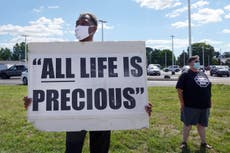Execution date set for ‘one of most mentally ill prisoners in Texas history’
Jurors admitted to racial bias in death penalty case
Officials have set an execution date in early 2023 for a man on death row described by critics as “one of the most mentally ill prisoners in Texas history,” the final step in a conviction process with documented instances of racism.
In 2005, at age 21, Andre Thomas, a Black man, was sentenced to death for the murder of his estranged wife, Laura Boren, a white woman, their son Andrew, as well as Ms Boren’s daughter Leyha.
According to his attorneys, Thomas who began hearing voices in his head at age 9, committed the murders in the midst of documented psychosis, believing his family members represented Jezebel, the anti-Christ, and an evil spirit, before attempting stabbing himself in the heart. He didn’t die, and later turned himself in.
“Andre Thomas is one of the most mentally ill prisoners in Texas history,” Maurie Levin, Thomas’s attorney, said in a statement. “His profound illness led him to remove both of his eyes and has rendered him incompetent for execution. For the past 13 years Mr. Thomas has resided at the Wayne Scott Unit, where the most mentally ill Texas prisoners are housed. There he is given multiple powerful anti-psychotic drugs, which manage only to mitigate his auditory and visual hallucinations.”
Thomas doesn’t dispute that he committed the murders; instead, his attorneys argue he was mentally unfit to stand trial, let alone be executed.
Two days before the 2004 murders, Thomas was diagnosed in a hospital as psychotic and suffering from hallucinations, following one of many suicide attempts, but he wandered away from the facility before he could get further care.
Once in jail, Thomas removed one of his eyes while awaiting trial, prompting the state to declare him temporarily unfit to stand trial, and he was sent to a state mental hospital. Forty-seven days later, doctors there declared Thomas ready to be tried, and the Texas man’s attorneys didn’t raise the question of his mental competence. As a result, the jury didn’t hear about his lengthy history of mental health crises.
Critics say there were further issues with the trial process.
Because the case involved a murder committed by a Black man against his white ex-wife, jurors were asked on their screening questionnaires about their views on interracial relationships.
Three jurors, all of whom served on the all-white jury that sentenced Thomas to death, evinced explicit disapproval of interracial relationships.
“I don’t believe God intended for this,” one wrote, while another said they believed ‘we should stay with our Blood Line.’”
At trial, prosecutors played explicitly to racist fears, with attorneys asking if the jury was comfortable to “take that risk” and allow Thomas to survive, meaning he could someday “ask your daughter or your granddaughter out.”
“The importance of having a jury that did not already come with existing bias is very strong [in Thomas’ case],” Ngozi Ndulue, deputy director of the Death Penalty Information Center, told Texas Observer this October. “It’s really profound to see the lack of effort on the part of an attorney that would allow these jurors to serve.”
That month, the Supreme Court declined to review Thomas’s case, with three liberal justices dissenting.
“This case involves a heinous crime apparently committed by someone who suffered severe psychological trauma,” Justice Sonia Sotomayor wrote in her dissent. “Whether Thomas’ psychological disturbances explain or in any way excuse his commission of murder, however, is beside the point. No jury deciding whether to recommend a death sentence should be tainted by potential racial biases that could infect its deliberations or decision, particularly where the case involved an interracial crime.”
Thomas is set to be executed in 5 April, 2023.
Texas has one of the country’s most prolific death chambers in the country, one with a long and ongoing history of singling out people of colour for disproportionate punishment.
The Independent and the nonprofit Responsible Business Initiative for Justice (RBIJ) have launched a joint campaign calling for an end to the death penalty in the US. The RBIJ has attracted more than 150 well-known signatories to their Business Leaders Declaration Against the Death Penalty - with The Independent as the latest on the list. We join high-profile executives like Ariana Huffington, Facebook’s Sheryl Sandberg, and Virgin Group founder Sir Richard Branson as part of this initiative and are making a pledge to highlight the injustices of the death penalty in our coverage.




